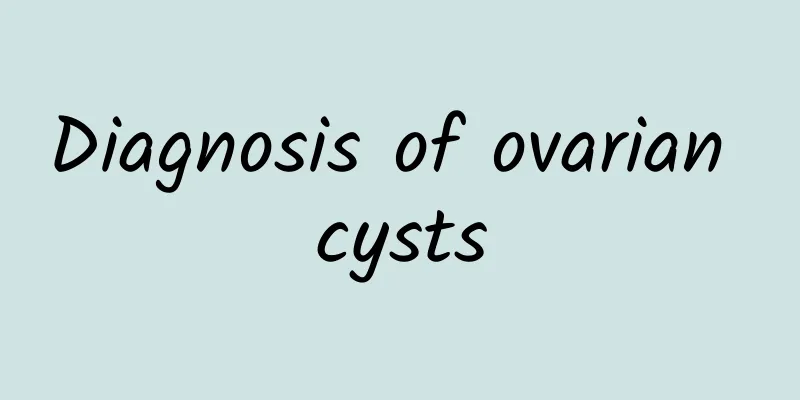Diagnosis of ovarian cysts

|
Ovarian cyst is a tumorous gynecological disease, which brings great trouble to patients. And ovarian cysts are usually in the late stage when they are treated, because early diagnosis of ovarian cysts is difficult. So, let's learn about the diagnosis method of ovarian cysts to help patients detect and treat them early. In daily life, go for regular physical examinations and always pay attention to whether your body has any signs of ovarian cysts. If there are some reactions, you need to find out what is causing the discomfort. To confirm whether it is an ovarian cyst, you need to go to the hospital for specific examinations, check your blood test indicators, CEA, CA125, and do MRI and other examinations to confirm the diagnosis. If it is confirmed to be an ovarian cyst, first of all, don't panic, you must make a judgment based on the specific situation on how to treat it and seek multi-faceted consultation. With the emergence of early diagnosis methods for ovarian cysts, treatment techniques and postoperative comprehensive treatment are becoming more mature. Diagnosis of ovarian cysts: How can we make a clear diagnosis and treatment? We should pay attention to distinguishing it from the following diseases: 1. Ovarian tumor-like lesions: Follicular cysts and corpus luteum cysts are the most common. They are usually unilateral, less than 5 cm in diameter, with thin walls, and disappear on their own within 2 months. 2. Fallopian tube and ovarian cysts: They are inflammatory cysts, often with a history of infertility or pelvic infection. Cystic masses form in the adnexal areas on both sides, with clear or unclear boundaries and limited movement. 3. Uterine fibroids: Subserosal fibroids or cystic changes of fibroids can be easily confused with ovarian solid tumors or cysts. Fibroids are often multiple, connected to the uterus, and accompanied by menstrual abnormalities such as menorrhagia. During examination, the tumor moves with the uterine body and cervix. 4. Pregnant uterus: In early pregnancy, the uterine body and cervix seem to be disconnected during triple examination, and the soft uterine body is easily mistaken for an ovarian tumor. However, if the pregnant woman has a history of amenorrhea, it can be identified by detailed medical history, HCG measurement or B-ultrasound examination. 5. Ascites: Large amounts of ascites should be differentiated from giant ovarian cysts. Ascites often occurs in patients with a history of liver disease or heart disease. When lying flat, the two sides of the abdomen bulge like a frog's belly. Percussion produces a tympanic sound in the middle of the abdomen, solid sounds on both sides, and positive shifting dullness. When lying flat, patients with giant cysts have a bulge in the middle of the abdomen, dull sounds on percussion, tympanic sounds on both sides of the abdomen, and negative shifting dullness. The boundaries of the lower abdominal mass are clear, and B-type ultrasound examination can be used for differentiation. 6. Advanced diagnostic techniques such as color B-ultrasound, X-ray examination, and laparoscopy can provide early diagnosis of ovarian cysts. Special topic on ovarian cysts: http://www..com.cn/fuke/ncnn/ |
<<: Diagnosis of cervical erosion
>>: Treatment of ovarian cysts
Recommend
Can ovarian cysts cause back pain? What should I pay attention to after treatment?
Can ovarian cysts cause lower back pain? Generall...
Does low menstrual flow affect egg quality?
For female friends, they experience menstruation ...
The difference between adenomyosis and endometriosis
Adenomyosis and endometriosis are two different g...
What are the common causes of cervical hypertrophy?
Cervical hypertrophy is a common cervical disease...
Is walking the right thing to do? 8 tips to help you lose weight easily
In order to stay healthy, lose weight, or relieve...
Stop calcium! Taking more than 500 mg of calcium tablets a day increases the risk of heart disease
Many elderly people have osteoporosis problems to...
Patients with adnexitis can often take litchi kernel honey drink
Litchi kernel honey drink has good effects of reg...
Several methods to prevent cervical erosion that need attention
In view of the harm that cervical erosion brings ...
Treatment of dysmenorrhea caused by cold-dampness stagnation
Three months ago, when the weather started to get...
Do women know what cervicitis is? What are the hazards of cervicitis in women?
Because of various reasons, female gynecological ...
Analyze the common risk factors of vaginitis
Vaginitis is a gynecological disease that can occ...
What should I do if I have a stomachache three days after abortion?
What should I do if I have a little stomach pain ...
How to prevent endometriosis
The body structures of men and women are differen...
How much does it cost to treat pelvic peritonitis?
How much does it cost to treat pelvic peritonitis...
Do pregnant women need surgery for ovarian cysts?
After getting an ovarian cyst, some special cases...









